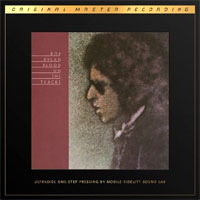Bob Dylan • Blood on the Tracks
 here may have
been some quibbling about Mobile Fidelity’s choice of music for the first seven of
its super-special One-Step 45rpm LPs, but that surely ends with this latest addition to
the series. Blood on the Tracks is a masterpiece from one of popular music’s
true geniuses and a Nobel Prize winner to boot (now there’s a subject sure to cause
some quibbling, if not outright consternation). It has all of the important identifying
marks of Bob Dylan’s oeuvre: dense wordplay and imagery, soulful and enterprising
music, a minor hit (“Tangled Up in Blue”) and a pair of challenging epics
("Lily, Rosemary and the Jack of Hearts" and "Idiot Wind"). I’ve
stated it before about Dylan and I’ll state it again: you either know this music or should
know it. And this pricey set is a good place to begin -- a definitive version of a
definitive album. here may have
been some quibbling about Mobile Fidelity’s choice of music for the first seven of
its super-special One-Step 45rpm LPs, but that surely ends with this latest addition to
the series. Blood on the Tracks is a masterpiece from one of popular music’s
true geniuses and a Nobel Prize winner to boot (now there’s a subject sure to cause
some quibbling, if not outright consternation). It has all of the important identifying
marks of Bob Dylan’s oeuvre: dense wordplay and imagery, soulful and enterprising
music, a minor hit (“Tangled Up in Blue”) and a pair of challenging epics
("Lily, Rosemary and the Jack of Hearts" and "Idiot Wind"). I’ve
stated it before about Dylan and I’ll state it again: you either know this music or should
know it. And this pricey set is a good place to begin -- a definitive version of a
definitive album.
To review the particulars of One-Step, for each release, the lacquers, cut at 45rpm, are used to create what Mobile Fidelity calls "converts," which are formed into the stampers from which the records are pressed. This eliminates two processes and two sets of metal parts, putting the stampers two steps closer to the source material -- the analog master tapes. But there is a downside to such a scaled-down process: stampers wear out and can have defects or become damaged, limiting each One-Step pressing run to whatever number of LPs the stampers can faithfully create. Three things have changed from the beginning of the One-Step series, with the release of Santana’s Abraxas, to now. First, more copies of new titles are available. There were only 2500 of Abraxas, which is surely responsible for secondhand prices that are many times the original asking price. For Blood on the Tracks, 9000 copies are expected. This brings us to the second change: the list price has increased from $100 to $125 per title. Third and most significant, and related to the higher price, each LP is pressed on SuperVinyl, a special carbonless formula whose advantages are central to analog playback: lower noise and better groove definition, which lead to more musical detail. SuperVinyl is more expensive than even the best traditional formulations and it's also much more difficult to work with, maintaining exact temperature during pressing being vitally important. RTI was heavily involved in SuperVinyl's development, and it is exclusive to records they press. Many versions of Blood on the Tracks exist, but this one is in a sonic category all its own. It represents a transformation of the album's sound, at least as it has been known. The poised resolution, visceral punch, low-end definition, and midrange presence present a different view of the music, which is more emotionally wrought, as though Dylan was on both a psychological and creative edge while making this album. I have two other copies of Blood on the Tracks, both original issues, one from the US and the other from Japan. The US LP [Columbia X698] sounds more crisp and forward than the slightly softer, fuller Japanese pressing [CBS/Sony 25AP 286], which is also quieter. Neither displays the immense musical detail and overall clarity of the One-Step release or its digital-like lack of surface noise. I wouldn't call the sound of any of these LPs one-dimensional, but the One-Step pressings certainly sound spatially complex in ways that others don't. Dylan's voice is more rounded and separate from the rest of the mix. This Blood on the Tracks is both different and
distinctly better -- a version to listen to intently and savor, because of the greater
insight it brings to this important music. It's a work of exuberance, of the desire to
create the best LPs possible, which, thanks to the One-Step process and SuperVinyl, Mobile
Fidelity can rightly claim here and now. |
